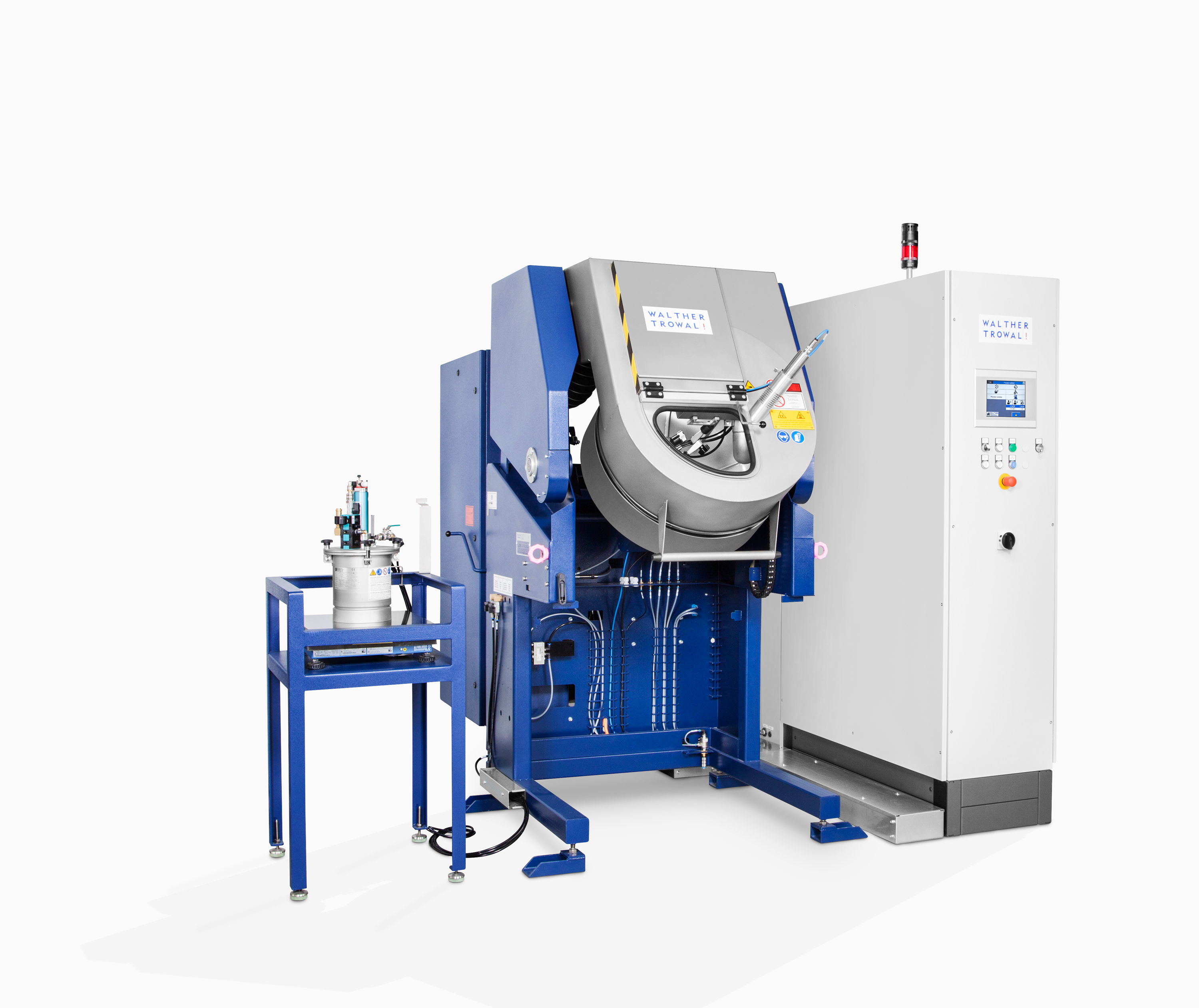At the Formnext exhibition 2022 Walther Trowal presents two surface treatment technologies: Mass finishing and coating of small components in rotary drums. In the AM post process machine the surface of 3D printed components is refined by deburring, smoothing or polishing; in the Rotamat coater the component surface is coated with lacquer materials.
In one single operation the AM post process machine, model A2, eliminates the high surface roughness that is typical for 3D printed components. Usually such rough surfaces are caused by the so-called “staircasing” effect, markings from removed support structures and residual powder sintered onto the component surface.
Walther Trowal developed the A2 machine specifically for treating complex metal components. For, topology-optimized work pieces with intricate – frequently bionic – shapes cannot be finished manually with consistent results. Mass finishing has proven to be the ideal technology for dealing with such challenging finishing applications. The constant “rubbing” of the grinding/polishing media against the work pieces is not only gentle but also produces a homogeneous surface finish. Moreover, the media also reaches difficult-to reach internal surface areas and undercuts. The design of the new finishing machine is based on the rotary vibrator concept. These machines have proven themselves in numerous industrial finishing applications around the world.
AM post process systems are running fully automatically and produce excellent and consistent surface finishes. In contrast to electro-chemical finishing systems the high luster polishing effect is achieved in one single operation. Because of their compact design and small footprint the A2 machines can be easily integrated into interlinked manufacturing operations.
With the Rotamat R 60 3D printed components can be quickly and evenly coated with a variety of different lacquer materials. Like the A2 finishing machine the R 60 coater was specifically adapted to the requirements of additive manufacturing: Even the most complex and intricate components can be evenly coated with absolutely repeatable results.
Since additive manufacturing is usually utilized for relatively small production volumes, the Rotamat offers a capacity (expressed in volume) from 2 to 15 liters per batch. Such a capacity is more than sufficient for the small production runs typical for 3D printing operations. Why should the customer invest in larger and significantly more expensive machines, if they are not required?
Frank Siegel, the sales manager “coating technology” at Walther Trowal, wants to ensure that his customers are well taken care of: „The lacquer producers are currently working very hard to develop new coating systems for the base materials used in 3D printed components. By closely working with them we make sure that our customers achieve excellent coating results on their 3D printed components with the new lacquer materials in their existing Rotamat machines.
Walther Trowal at the Formnext exhibition 2022
November 15 to 18, 2022 in Frankfurt am Main, Germany
Hall 11, Booth 11.0C29
About Walther Trowal
Surface finishing technologies from the inventor of the “Trowalizing” process
Since 1931 Walther Trowal has been developing and producing systems for the refinement of surfaces. Initially focusing exclusively on mass finishing – the term “Trowalizing” originated from the company’s cable address “Trommel Walther” – Walther Trowal has continuously expanded its product portfolio.
Over time the company has developed a broad range of machinery and systems for mass finishing, shot blasting and coating of mass-produced small components.
With the invention of new systems like, for example, drag finishing and the development of special finishing methods for 3D printed components, the company has proven its innovative capabilities again and again.
Walther Trowal develops and implements complete surface treatment solutions that can be seamlessly integrated into linked production systems existing at the customers. This includes the entire process technology, perfectly adapted to the specific surface finishing requirements of the work pieces: Equipment and the respective consumables always complement each other in a perfect manner.
Each individual work piece and each manufacturing process must meet special technical requirements. That is why the experienced process engineers in our test lab, in close cooperation with the customers, develop the optimal process technology for the finishing task at hand. The result: Work piece surfaces that meet exactly the required specifications…with short processing times and a high degree of consistent, repeatable results.
Walther Trowal is one of the few manufacturers who develops and produces all machines and mass finishing consumables in-house… including ceramic and plastic grinding and polishing media as well as compounds.
The company’s equipment range also includes all kinds of peripheral equipment for handling the work pieces like lift and tip loaders, conveyor belts and roller conveyors, in addition, special driers for mass finishing applications and, last-but-not-least, systems for cleaning and recycling of the process water.
With its exchange program for wear items like work bowls, which are part of a continuous recycling program, Walther Trowal conserves valuable resources and, thus, makes a significant contribution towards sustainability in the field of industrial production. Quick technical support and the global repair and maintenance service ensure high uptimes for our equipment.
Walther Trowal serves customers in a wide range of different industries all over the world, for example, automotive, aerospace, medical engineering and wind power.
Download of photo files:


![[Translate to Englisch UK:] Additiv gefertigte Teile verlassen die Maschinen mit perfekter Oberfläche.](/fileadmin/user_upload/Walther-Trowal-T0209160011.jpg)
